Efterklang
Forever fascinated by the purest possibilities of sound, since forming in 2001 Efterklang have consistently adjusted their sonic modus operandi to suit very specific inspirations.
The results the Danes have produced so far – most notably across three acclaimed albums, 2004’s Tripper, 2007’s Parades and 2010’s Magic Chairs – have each explored different directions, each an end product of remarkably studied songcraft and emotional resonance.
But Piramida is perhaps the band’s greatest achievement: an album bringing the outside in, informed by frozen time and the relics humanity leaves in its expanding wake. Its roots were laid in 2010, when the band first saw photographs of a forgotten settlement lying, slowly dying, on Spitsbergen, an island of the Svalbard archipelago midway between the Norwegian mainland and the North Pole. This ghost town, which the trio eventually visited in August 2011 (drummer Thomas Husmer left before Piramida’s commencement), would give their fourth album its title, and comprise the conceptual catalyst for its contents.
Once an outpost for some 1,000 Russians, the former mining facility was abandoned in January 1998, near as overnight. Today the town is in a state of slow decay, as deserted possessions erode and buildings where once people were schooled, fed and entertained return to nature. Between the empty oil drums and fuel tanks, glass bottles and lampshades – and sea birds, and polar bears – the band discovered the world’s northernmost grand piano, standing proudly in a concert hall that once held 400 people. Its notes can be heard on Piramida, perhaps for the first time anywhere in over a decade.
The results the Danes have produced so far – most notably across three acclaimed albums, 2004’s Tripper, 2007’s Parades and 2010’s Magic Chairs – have each explored different directions, each an end product of remarkably studied songcraft and emotional resonance.
But Piramida is perhaps the band’s greatest achievement: an album bringing the outside in, informed by frozen time and the relics humanity leaves in its expanding wake. Its roots were laid in 2010, when the band first saw photographs of a forgotten settlement lying, slowly dying, on Spitsbergen, an island of the Svalbard archipelago midway between the Norwegian mainland and the North Pole. This ghost town, which the trio eventually visited in August 2011 (drummer Thomas Husmer left before Piramida’s commencement), would give their fourth album its title, and comprise the conceptual catalyst for its contents.
Once an outpost for some 1,000 Russians, the former mining facility was abandoned in January 1998, near as overnight. Today the town is in a state of slow decay, as deserted possessions erode and buildings where once people were schooled, fed and entertained return to nature. Between the empty oil drums and fuel tanks, glass bottles and lampshades – and sea birds, and polar bears – the band discovered the world’s northernmost grand piano, standing proudly in a concert hall that once held 400 people. Its notes can be heard on Piramida, perhaps for the first time anywhere in over a decade.

